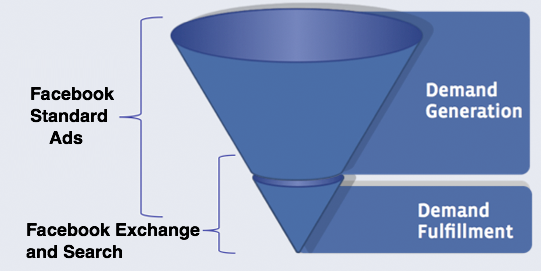Up until recently, all of Facebook’s advertising products have worked within the realm of Facebook itself. Currently only open to select third-party advertisers, real-time bidding ads run through Facebook Exchange will pull information from your web browsing activities outside of Facebook to refine Facebook ads to be more relevant and timely. For example, you can target a Facebook ad to the audience you want to reach, however, the ad is targeted by pulling in information you have provided via your Facebook profile, such as interests and Pages users “Like”. Let’s say a new dog-grooming store is opening near you. Traditional Facebook ads would target based on your neighborhood or if you have indicated an interest in dogs. Simple. Facebook Exchange extends the relevancy and timeliness of ads further by noticing your search activity outside of the Facebook ecosystem. Let’s say you have a new puppy and haven’t indicated you like dogs on Facebook, but you will still see an ad for the new dog-grooming store based on the information collected when you browsed the web for dog grooming services in your neighborhood. It makes a lot more sense to put an ad in front of someone who is specifically looking for a product or service, rather than just indicating an interest. What really differentiates Facebook Exchange from traditional Facebook ads is that it’s the first Facebook advertising product that is intent driven, rather than discovery-based. This is what makes it a game changer.
Facebook Exchange is a win-win for Facebook, businesses and consumers. TechCrunch reports, “Exchange is currently in testing with eight advertising demand-side platforms, and it will become more widely available in the next few weeks for traditional Facebook sidebar ads charged at cost-per-thousand-impressions, but not Sponsored Stories or mobile.” It appears Facebook is hoping to climb out of the financial dip they experienced after the IPO last March.
The following image visually represents how marketing will be affected by Facebook Exchange. A cookie collects information about your search and browsing history and then to provide retargeting information. The new real-time bidding ad format of Facebook Exchange takes the focus on brand recognition and refocuses the efforts on fulfilling the demands of users through the more relevant ads. In terms of gains for Facebook, it should amp up revenue since advertisers will be willing to pay much more for more accurately tailored ads.
For those interested in the technology behind real-time bidding, Techcrunch explains precisely how Facebook Exchange works:
- A user visits a travel site that’s hired a DSP rigged up with Facebook Exchange
- A cookie is dropped on that user’s computer, typically when they’ve shown purchase intent
- If the user fails to make a purchase, or the advertiser wants to market to them more, the DSP contacts Facebook and gives them the user they wish to target’s anonymous User ID
- The advertiser pre-loads creative for ads that would target that user
- When the user visits Facebook it recognizes the cookie dropped by the DSP
- The DSP is notified and allowed to make a real-time bid to show the user ads
- The DSPs with the highest bids get their highly-targeted ads shown to the user
- If the user disapproves of being shown the ad and ‘X’s it out, they’re shown a link to the DSP where they can opt out of future Facebook Exchange ads

We’re looking forward to the statistics to come as Facebook more widely releases and puts into practice real-time ad bidding through Facebook Exchange. It could be just what Facebook needs to grow ad revenue and connect the platform with other advertising insights, keeping pace with what users will surely some to expect as the user experience takes baby steps toward matching their stride and providing seamless, relevant information for consumers.
Post written by Tia Marie Kemp aka @TiaMarieKemp. To learn more from Sociality Squared, become a fan!





